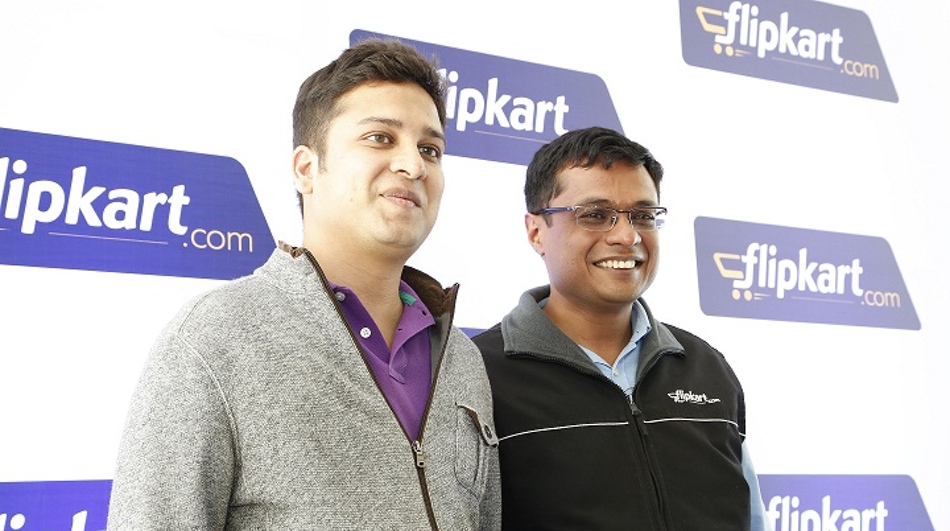
Photo credit: maciejbledowski / 123RF.
The strangest thing happened on Friday last week. Flipkart was advertising OnePlus smartphones on its store, even though the phone maker claimed an exclusive agreement with Amazon. As one can imagine, this created confusion in the industry. A seemingly flummoxed Carl Pei, co-founder and CEO of OnePlus, tweeted to Sachin Bansal asking for clarifications.
.@_sachinbansal brother, what's this? We're exclusive with @amazonIN pic.twitter.com/0QBoyagoXz
— Carl Pei (@getpeid) December 16, 2016
This happened just as Flipkart was to launch its last “sale” event of the year, supposedly focused on exclusive device and appliance launches.
To add to the embarrassment, Carl went on to state how he doesn’t approve of the price cut Flipkart hinted at for the sale.
This is the problem. For premium brands, trust is everything. We would never betray trust by dropping prices like this. https://t.co/NvhIgUa1Op
— Carl Pei (@getpeid) December 16, 2016
And an official tweet followed.
We are exclusive with @amazonIN and advice users to buy OnePlus through official channels. We can't guarantee the authenticity elsewhere. pic.twitter.com/tcJZRvud0d
— OnePlus India (@OnePlus_IN) December 17, 2016
Troublingly, this isn’t the only awkward moment the frontrunner (depending on who you ask) of India’s startup and ecommerce movement has had to face this year – often overshadowing some strides in business.
2016 has been cruel to Flipkart in many ways, despite fluffy stories in the mainstream media in the early days. The company’s year began happily enough with a new CEO, and a jab at Amazon.
But soon after, it shut down its grocery delivery app, Nearby, less than five months after the company started testing it.
Then, the company saw a valuation cut – the first in a series of similar markdowns it would see through the year. At first, it was easy to look at the bright side – in fact, I even argued that the cut by Morgan Stanley wasn’t necessarily a bad thing for a company with bloated valuations looking for funding. After all, Morgan Stanley only held a minuscule stake in Flipkart. It wasn’t a lead investor. And not to forget, some of those markdowns were a part of a global trend, where mutual funds took shears to big name startups like Dropbox, Uber, and Airbnb.
See: Everybody, relax. Here’s why Flipkart’s valuation markdown is not really a bad thing
But then, a series of other investors followed suite. Sure, the basic argument stays the same: a lower valuation might be helpful in raising funds. Yet, when markdowns become a trend, it becomes emblematic of wavering industry confidence.
By November-end, Morgan Stanley pegged Flipkart at around US$6 billion – down from the US$15 billion the company started the year with.
“Mutual fund mark-to-market is a purely theoretical exercise and is not based on any real transactions. We are seeing a strong traction in our business momentum and operating performance. We continue to be focused on innovating for the customer, growing the market and executing on our long-term growth agenda,” a Flipkart spokesperson had said.
A fair point, given that Flipkart is not publicly traded, and no outsider can really know what is going on with its finances. But, for the fiscal year ending March 2016, Flipkart Internet, the company operating the online commerce arm of Flipkart, posted around US$340 million in losses – twice as much as the year before. Revenue grew two-fold too, but heavy discounting, expensive ad buys, and the continued fight with Amazon is making it hard for the company to translate a stronger topline into better margins.

Binny Bansal (left) and Sachin Bansal are the two co-founders of India’s top homegrown ecommerce startup. Photo credit: Flipkart.
The buzz in the industry is that Indian unicorns like Flipkart and Ola are having a hard time raising fresh funds at the valuations they want. That’s because investors worry about their profit-making capabilities, and think the Indian companies are losing market share to global rivals like Amazon and Uber.
“Amazon and Uber are well-funded internationally and have no problem bringing in funds as and when required. At no point in time are they being valued with respect to what’s happening in India. But in the case of Flipkart and Ola, they need to raise money periodically,” said Harminder Sahni, founder of consultancy firm Wazir Advisors, to the Business Standard.
“I don’t think they can survive for too long if they are going to be egoistic about not raising money at a lower valuation.
Flipkart has stuck to its guns, saying traction matters, not markdowns. The company did not respond to Tech in Asia’s queries about how Binny and team plan to steer the company in 2017, and whether they would do anything differently, learning from this past year.
Analysing the issues
Flipkart’s problem goes well beyond the mere threat of Amazon. After all, the Bangalore-based company did beat its US-based rival during the initial days of the country’s big shopping season.
A Bank of America – Merrill Lynch report has said Amazon India is likely to stay second to Flipkart till at least 2019.
Flipkart’s seems to be the classic case of overpromising and under delivering, not to mention some communication issues. New CEO Binny Bansal has been saddled with that baggage ever since he took charge.
Under Binny, the company has introduced a slew of measures like easy financing, faster delivery, a digital wallet, adding more sellers, a revised returns policy, introducing new categories, and its own brand of products. Flipkart’s fashion unit Myntra bought rival Jabong, and now the companies together control around 80 percent of the online fashion market (Flipkart and Myntra operate as separate entities). The push to get the house is order is evident.
However, the poster child of India’s startup’s unbecoming moments seem to overshadow much of those accomplishments.
It all started during the heydays of ecommerce and funding in India. Giddy with influx of funds, the mainstream media’s cheerleading, and the promise of growth, the company kept hyping up its business.
“Many of these players, including Flipkart and Snapdeal, have made extremely reckless claims for GMVs in the past,” Arvind Singhal, chairman of retail consultancy Technopak, told Tech in Asia in May. He was referring to statements made by the then head of commerce at Flipkart, Mukesh Bansal last year. Mukesh had said that Flipkart was aiming to sell goods worth US$10 billion in 2016 and US$100 billion by 2022. He quit Flipkart in February. By that time, Flipkart’s average monthly annualized GMV was only about US$5 billion.
CEO Binny Bansal changed tack to focus on customer service rather than goods sold, but by then Amazon, and even Snapdeal were already doing it, and Flipkart was late to the game – at least with communicating its intents, if not with the actual implementation of customer-focused metrics.
See: Flipkart’s bruising row with IITs and IIMs sheds light on deeper problems
In June, big investor Tiger Global decided to tighten its reign on the company as MD Kalyan Krishnamurthy took over as head of categories at Flipkart. He was supposed to be a “house cleaner”. The company has been seeing a mass exodus of senior level executives all year, which continued after he came on board.
See: Indian unicorn Flipkart’s top-level exodus snowballs, CFO Sanjay Baweja quits
Star trouble
Flipkart made some stellar hires, but goofed up its message. The company seemed to latch onto one “superstar” employee after another, instead of speaking about the entire team. Once the celebrated founders Sachin and Binny Bansal merged with Myntra, Mukesh Bansal (none of them are related) became the company’s wonder child. Then it was ex-Googler Punit Soni. Both Mukesh and Punit have since quit the company. Punit’s exit was mired with failed experiments as Flipkart ditched its app-only strategy, and later, with a Twitter chat that seemed to suggest his pick for winner was Amazon.
If I was forced to invest all my money in one company today, it would be Amazon.
Killer instinct, incredibly long view, deep product/tech— punitsoni (@punitsoni) July 26, 2016
Once the stars had left Flipkart’s building, employees at Flipkart set their expectations on Kalyan. This was also when Flipkart got into a major brouhaha with leading Indian colleges over hiring practices. Flipkart has cut down on the superstar push since (it helps that Kalyan is media shy). But a lot of the company’s public image was hampered in the aftermath of those days.

Mukesh Bansal, ex-CEO of Myntra, and Sachin Bansal, co-founder and CEO of Flipkart
Meanwhile, management had serious issues to deal with, like flat shopper spending at a time when Amazon is growing, or its stance to raise seller commissions that was almost immediately undercut by Amazon.
Boomerang
As Flipkart sets its house in order, the latest hit came from a panel discussion that founder and former CEO Sachin Bansal participated in earlier this month. In what is now largely being seen as a desperate attempt to get help, Sachin and Ola CEO Bhavish Aggarwal called upon the Indian government to help them over global rivals, a la China.
Industry watchers called them out immediately.
Now Singapore firm @Flipkart & Canadian-Russian-Japanese firm @Olacabs claim they're Indian & govt should stop US firms @amazonIN & @Uber
pic.twitter.com/vbHbXZgjHK
— Mahesh Murthy (@maheshmurthy) December 8, 2016
The plea to get government attention boomeranged in the worst possible way, and could have a negative impact on Flipkart’s fundraising arrangements. This in turn could have a direct impact on business, making it more than a mere faux pas. Media reports have suggested the company was in talks to raise money from retail giant Walmart.
The cry for protectionist-like regulations ended up making Sachin Bansal (and Bhavish) the laughing stock of India’s startup and Twitter worlds.
See: Flipkart and Ola CEOs: from startup poster boys to crybabies
Uber’s Travis Kalanick, meanwhile, rode the popular sentiment of ridicule with a stinging salvo.
“I will apply to be a citizen of India if this is what gets us over the hump,” he said at a media event in New Delhi, cleverly showing what he thought of Flipkart and Ola’s complaints while going about embracing India.
Learnt about a religion called cricket from the god himself!
Thanks for having me over @sachin_rt pic.twitter.com/7mCRF8EmFI
— travis kalanick (@travisk) December 12, 2016
Binny Bansal’s job for 2017 is clear: take a cue from Travis and make sure everyone in the company toes that line (it is mostly Sachin who has stirred trouble with his statements, not Binny). No ad hominem attacks, or trash talking between rivals, no superstar syndrome, and certainly no excuses.
This is an opinion piece.
This post India’s beloved Flipkart’s had a crappy 2016 appeared first on Tech in Asia.
from Tech in Asia https://www.techinasia.com/flipkarts-crappy-2016
via IFTTT

No comments:
Post a Comment